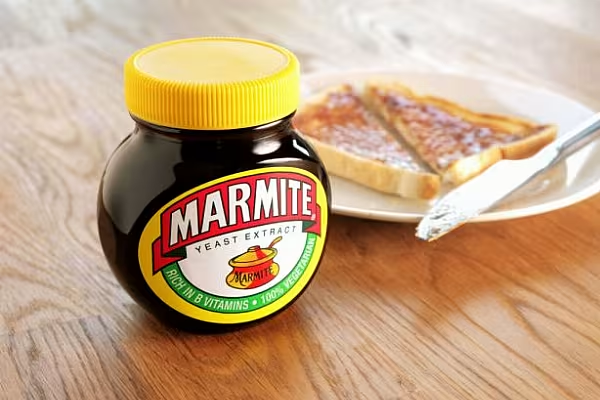Marmageddon, Toblerone-gate, shrinking fish fingers. Get ready for more food fights.
The 12% slump in sterling following Britain's vote to leave the European Union is feeding through to food. Prices may be as much as 5% higher this time next year, and some grocers are already feeling the pinch from higher costs for milk, cheese and pork.
Big U.K. supermarkets seem to be fashioning themselves as a force for consumers against the evils of suppliers' price hikes. Tesco Plc Chief Executive Dave Lewis, fresh from his spat with Unilever Plc over the price of Marmite, last week warned companies not to try their luck with "illegitimate" price hikes.
Looking at the margins of the big consumer goods groups and the grocers, retailers are right to fight against higher sourcing costs. But in reality, their willingness to do battle should have limits. A little inflation would be good for them.
Consumers, whose spending power has picked up recently, may not balk too much at the higher tickets. For the stores, steadily rising prices would help them build a cushion to protect against jumps in costs.
Falling food prices over the last two years has meant that shops had to shift a higher volume of products to reach the same value of sales. This has created a squeeze for supermarkets, who've had to pay higher wages and business taxes.
True, shoppers won’t want to fork out too much, so a problem will come if cost pressures really start to rocket.
The big supermarkets face a dilemma. Five years ago, shoppers flocked to the German no-frills discounters Aldi and Lidl after Tesco and Wm Morrison Supermarkets Plc abandoned their tradition of being the low-price champions.
While the discounters' growth has slowed considerably over the last year, the sticking point for the British grocers is that if they raise prices too much, fleeing shoppers might give Aldi and Lidl a new lease on life.
That gives an added impetus to supermarkets' efforts to force consumer goods groups to bear some of the pain. The big branded manufactures will be mindful of the threat from the discounters too.
The majority of the goods that Aldi and Lidl sell are their own private labels, not the big brands. That pushes global suppliers further into the arms of the big grocers for distribution, so they might be more open to offering some concessions the next time they do battle with supermarkets. Both sides will battle to defend their margins, though the grocers have more to lose.
For all Lewis' warnings, Tesco probably has the strongest hand. It's Britain's biggest supermarket by market share and is expanding sales at its fastest rate for three years, according to research group Kantar Worldpanel. For suppliers, Tesco probably offers the best prospects right now, so manufacturers will be inclined to offer it their best deals.
Wm Morrison also has a hidden strength. It has greater leeway to control prices as it makes about a quarter of all the food it sells. And chief executive David Potts is putting more volume through its factories, thanks to its deals to supply Amazon.com Inc. That should help offset some of the cost pressures.
J Sainsbury Plc, on the other hand, looks vulnerable. Its same-store sales performance is deteriorating, and it's grappling with higher sourcing costs as it absorbs its acquisition of home goods retailer Argos. It will need to work doubly hard to persuade suppliers to give it favoured treatment.
This column does not necessarily reflect the opinion of Bloomberg LP and its owners.
News by Bloomberg, edited by ESM. To subscribe to ESM: The European Supermarket Magazine, click here.














